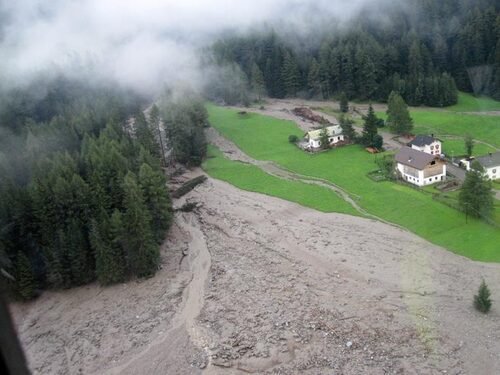14 Luglio – 20 Luglio
The Summer School focuses on three key areas:
1.Climate modelling for extreme meteo-hydrological and geo-hydrological hazard projections
2.Simulation and projection of extreme precipitation, floods, droughts and slope instabilities under a changing climate
3. Adaptation strategies.
This one-week program combines lectures with hands-on activities, offering participants a dynamic and
immersive learning experience. With over 20 international attendees, the Summer School provides a
unique opportunity to engage in diverse educational formats, including self-directed study, computer-
based group work, and oral presentations.
The Summer School is jointly organized by the Department of Geosciences at the University of Padova,
recipient of the MUR Excellence Project “Geosciences for Sustainable Development”, and by PE3-RETURN
(multi-Risk sciEnce for resilienT commUnities undeR a changiNg climate), an extended partnership funded
by Next Generation EU, the Italian PNRR, and the Ministry of University and Research.
The School is designed for young researchers—Ph.D. students, post-doctoral fellows, and early-career
scientists—interested in exploring the impacts of climate change on hydrological (extreme precipitation,
floods, droughts) and geological (slope instability, river morphodynamics) hazards and risks.
The lectures (see the schedule in the PDF below) are designed to address open and significant research questions and to foster interaction among participants. Strong emphasis is placed on e-learning, both
before and after the event: relevant papers will be made available for download as preliminary reading,
and the web will be extensively used for accessing and sharing lecture materials.
A key element of the program is the organization of group activities by the attendees. These aim to develop
original research ideas and collaborative projects inspired by the themes and discussions of the lectures. At
a minimum, each group is expected to present the results of their work in a formal presentation during the
final meeting, where all participants will also receive a certificate of attendance. Typically, group work is
supported by an “activator,” selected from among the more experienced participants or from the lecturer’s
team. During registration, participants will be asked to select their two preferred working groups, described
below.
WHEN AND WHERE
July 14 – July 19, 2025,
Venue: Istituto Veneto di Scienze Lettere ed Arti (IVSLA), Venice, Italy
REGISTRATION AND TUITION FEES
The tuition fee is € 200 and covers lectures, practical lab sessions, course materials, lunches, and coffee
breaks. The fee does not include accommodation or dinners. Travel expenses for up to ten international
students will be reimbursed by the School, up to a maximum of € 1,000 per student.
To register, please use the registration form available at the bottom of the webpage.
KEY DATES
– Application deadline: 13th June 2025
– Notification of selection: 20th June 2025
– Deadline for payment: 27th June 2025
SCIENTIFIC COMMITTEE
Marco Borga, Marco Marani, Nicola Surian (University of Padova, Italy)
WORKING GROUPSWG
Marani: Extreme Precipitation Event Modelling
This WG will focus on analyzing rainfall observations from the 5-min to 1-hour scale. Estimation uncertainty from GEV analyses will be compared with that from non-asymptotic Metastatistical Extreme Value Distribution (MEVD) methods. A cross-validation approach will be adopted and applied to available data from different rainfall regimes, in Italy and elsewhere. Participants wanting to explore the application of MEVD methods to their own data, beyond rainfall observations, are welcomed to join. The activities will be tutored by Dr. Maria Francesca Caruso and by ing. Santa Andria.
WG Dallan-Marra: Assessing Future Changes in Sub-Daily Precipitation Return Levels using Convection Permitting Climate models
In this working group we will evaluate the projected changes in extreme sub-daily precipitation using convection-permitting (CP) climate model simulations. We will focus on a study area characterized by complex orography and use both traditional and non-asymptotic extreme value analysis methods. Participants will learn how to estimate precipitation return levels for various durations (ranging from 1 to 24 hours) using different statistical techniques. They will learn how to quantify changes in these return levels and how to assess the statistical significance of the detected signals. The activity will be carried out in Matlab. Partecipants are NOT expected to be expert Matlab users, as the Matlab scripts will be provided by the tutors, but they are expected to have a laptop with a working Matlab version pre-installed.
WG Tramblay-Borga: Trend detection in time series of extreme events
Methods used to detect trends in intense rainfall or flood series will be presented. Firstly, sampling methods based on annual maximums or threshold exceedances will be introduced, with the problem of threshold selection, and identification of independent episodes (declustering). Then, non-parametric methods (Mann-Kendall test) will be compared with parametric methods, based on the adjustment of distributions adapted to extremes (Generalized Extreme Value et Generalized Pareto Distribution) in a non-stationary context. The issue of the ‘statistical significance’ of the results will be discussed within the different approaches. All the methods will be implemented from open-source R packages.
WG Brenna-Surian: River Dynamics in Response to High-Magnitude Flood Events
This WG will focus on processes (e.g., intense sediment transport, channel widening) that may occur in rivers and streams during high-magnitude flood events. We will analyze a catchment that was affected by the Vaia Storm (October 2018), starting from computing stream power at sub-reach scale. The next step will be analyzing channel changes, comparing images (high resolution aerial photos) taken before and after the flood. The last part of the activity will deal with interpretation and discussion of results, exploring relationships between driving factors (e.g., stream power) and channel processes (e.g., occurrence of debris floods, different magnitude of channel widening).The activity will be carried out using a GIS. Participants are expected to have a laptop with a GIS installed and basic knowledge about GIS (e.g., loading data, using and editing shapefiles).


